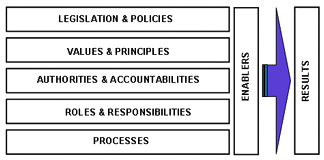(‘stu-&rd-“ship ) ,-n. the conducting, supervising, or managing of something; especially : the careful and responsible
management of something entrusted to one’s care <stewardship of public resources>
Business managers are stewards over public and private resources (human, financial and assets), and are expected to utilize these resources to achieve business results. In government like the private sector, business managers are accountable not only for the aggregate manner in which they discharge their stewardship responsibilities, but also for the propriety of individual transactions. Business managers have a duty to report and demonstrate their fulfilment of each of these accountabilities, within a financial management governance and reporting framework
Sound stewardship is an integral component of every business manager’s fiduciary responsibilities to strengthen oversight and sound management of public and private resources entrusted to the organization within a well articulated financial management governance framework. Sound stewardship is thus an integral governance instrument for a standard approach to resource management across organizations, and can be depicted below.
Sound management is about being accountable for one’s actions and the stewardship over entrusted resources. Effective steward ship acts hand-in-hand with controls, systems, and processes to enable you to provide assurance that your:
- activities and functions achieve their intended results;
- resources are used consistent with the organization’s mandate and mission;
- appropriate decisions are taken with comprehensive information and within an integrated risk management framework;
- program and functional resources are used effectively and efficiently, and are protected from fraud and mismanagement; and
- legislation and regulations are followed.
How does one “demonstrate sound stewardship”? You do this when you are in control and maintain a risk-based mind-set over the management of the resources and capabilities entrusted to you. This involves having an appropriate integrated control environment, with appropriate oversight by an audit committee, that ensures effective controls are developed and implemented with appropriate feedback to manage your risks, information and service delivery.
Stewardship of public and private resources needs to be supported by a sound control environment (assets, money, people, services, policy, ethics, etc.) that is integrated and effective, and its underlying principles are clear to all. Sound stewardship is achieved when many different control elements are closely connected and work successfully together across the organization and act hand-in-hand with other controls, systems, processes, accountabilities, and assurances. Maintaining integrated control across all the elements of your Management Accountability Framework (MAF) supports your stewardship of resources.
For you to demonstrate sound stewardship implies that there is alignment, efficiency, and cohesion in the delivery of your key functional and/or service activities. Sound stewardship implies a balance between managing inherent risks and integrated controls, to achieve intended results.
Likewise, integrated financial and performance information is critical in assessing risks and results, and must be appropriate within the context of the complexity of management issues that you face. Information quite simply directly impacts your decisions, and is of critical importance to the effectively being a good steward.
Are you comfortable with the stewardship of resources entrusted to your organization? Do you have the right elements in place? Do your have a sound management and financial stewardship framework in place? Are you in control? Do you have the tools to respond effectively? icorp.ca’s Insight service can help you discern the inner nature of complex management operations. So who is supporting your stewardship needs? GO THERE!™
For more information about icorp.ca’s Insight expertise, contact us.



